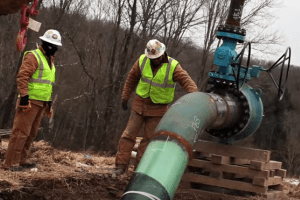
Fracking Study Find Streams And Rivers Could be Polluted By Gas Drilling. Early results from a hydraulic fracturing study indicate that such gas drilling operations in Pennsylvania’s Marcellus shale could pose a pollution threat to the state’s streams and rivers. According to a report from the Associated Press, the pollution problems could occur even when […]

Fracking Study Find Streams And Rivers Could be Polluted By Gas Drilling. Early results from a hydraulic fracturing study indicate that such gas drilling operations in Pennsylvania’s Marcellus shale could pose a pollution threat to the state’s streams and rivers. According to a report from the Associated Press, the pollution problems could occur even when there have been no fracking fluid spills or other accidents.
For several years now, gas drillers have been descending upon the Marcellus shale, a gas rich formation that extends through New York, Pennsylvania, West Virginia, Ohio, Maryland and Virginia. To get at the natural gas, drillers use a process called hydraulic fracturing, or fracking, which involves injecting water, sand, and a cocktail of chemicals at high pressure into rock formations thousands of feet below the surface. A single well may be fractured several times, using up to 3 million gallons of water in some locations. Treating and/or disposing of the contaminated flowback water from fracturing operations can pose groundwater and surface water quality management challenges for state regulators and gas developers.
Environmentalists in Pennsylvania are concerned that fracking could contaminate the state’s waterways, some of which supply water to cities along the East Coast. Fracking has already been blamed for instances of water contamination in several Pennsylvania communities.
The fracking study conducted by the National Academy of Sciences found differences in watersheds where gas drilling has occurred compared to those where it has not. According to the Associated Press, water conductivity was nearly twice as high in streams. Water conductivity can be an indicator of contamination by salts that are found in drilling waste water.
David Velinsky, vice president of the academy’s Patrick Center for Environmental Research, said the results were evidence that “there is indeed a threshold at which drilling, regardless of how it is practiced, will have a significant impact on an ecosystem,” the Associated Press said. Velinsky also said the study tried to account for other possible sources of salt contamination, but still saw a relationship between drilling and changes in water quality.
Not surprisingly, the gas drilling industry takes issue with the academy’s preliminary findings. An official with the Marcellus Shale Coalition told the Philadelphia Inquirer that the group “does not comment on preliminary, non-peer reviewed, unreleased ’studies’ that we have not even had the opportunity to examine.”
The same official also said that changes in total dissolved solids, which can also mean a stream is contaminated with salts, might not be the fault of drilling. “Pennsylvania has a long history of high TDS levels in our waterways – long before Marcellus production commenced just a few years ago,” the official wrote in an email.
For its part, Velinsky said the National Academy of Sciences believes the preliminary study findings indicate that further research is needed. The researchers plan to use the findings from this study to convince the state of Pennsylvania to allocate money for a more comprehensive investigation.
The personal injury attorneys at Parker Waichman LLP offer free, no-obligation case evaluations. For more information, fill out our online contact form or call 1-800-YOURLAWYER (1-800-968-7529).


